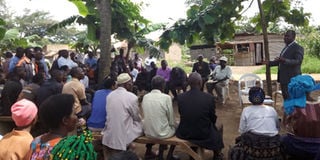Mpigi local council courts promote justice, harmony

Attentive. Lawyer Simon Peter Kawuki (standing on right) addresses residents of Katebo Village in Buwama Sub-county in a land conflict resolution meeting recently. PHOTO BY SADAT MBOGO
What you need to know:
- These courts were operationalised on June 8, 2006, to handle cases involving plaintiffs who cannot afford court fees in accordance with their quasi-judicial mandate
- Some of the cases handled by these courts include debts, contracts, assault and battery, conversion, damage to property and trespass
- They can also handle civil disputes governed by customary law including disputes in respect of land held under customary tenure, disputes concerning marriage, marital status, separation, divorce or parentage of children, disputes relating to the identity of a customary heir and customary bailment
- Many of the studies conducted on these LCCs revealed that they are more trusted by local population.
Mpigi. A decade after the operationalisation of local council courts (LCC), authorities in Mpigi District have embraced them to reduce the case backlog in main courts. The courts are viewed as an alternative dispute resolution avenue.
Mr Michael Lutalo, the LCCs desk officer in Mpigi District, on Wednesday said a total of 404 LCCs have been established and that residents are upbeat about the development.
Some of the sub-counties in Mpigi where LCCs are operating include Muduuma, Kiringente, Mpigi Town Council, Kamengo, Buwama Town Council, Bunjakko, Kayabwe Town Council, Kituntu and Nkozi.
“Our people in the district have welcomed these courts because there is easy access to justice on civil matters like debts, damage to property, land, trespass and conversion,” he said.
Mr Lutalo added that in order to strengthen the capacity of LCCs in the area and make them useful to the communities, training sessions were conducted for court members by the Ministry of Local Government through International Law Institute and African Center for Legal Excellence (ILI-ACLE).
“We could have constituted these courts long time ago like other districts did, but members lacked the required training to enable them effectively execute their work. We have now equipped them with the necessary skills and they can duly perform their duties without any hindrance,” he said.
Mr Swaibu Lubega, the Mpigi Resident District Commissioner, said given the nature of the cases recorded in the villages, he is convinced that 60 per cent of such cases will be handled by LCCs.
“They (LCCs) are going to bridge a big gap that has existed for a long time and will as well supplement our efforts to keep law and order. My only appeal is that the people support these courts so that we get positive results,” he said.
Disappointed
Mr Joseph Ssempijja, a councillor representing Buwama Sub-county, expressed disappointment with the way the magistrate courts have been handling most cases.
He said many of the cases have not been properly resolved in court because either the plaintiffs or accused persons don’t have money to hire lawyers or transport to attend court sessions when their cases are due for hearing.
“Some judges delay justice and that is why people are happy to go to local courts. They are near and for cases such as land conflicts, the members of these courts know the demarcations better than the judges,” he said.
Mr Hassan Ssebunya, a resident of Kayebwa Town, said he was denied justice in a case where his neighbour assaulted him over Shs150,000 debt.
“I reported the case at Kayabwe Police but since then, I don’t know whereabouts of my file because whenever I go there to raise a query, officers just tell me to come back the next day. I am tired of moving up and down. I take this (introduction of LCCs) as a blessing to resolve such petty cases in villages,” he said.
However, Mr Josephat Mbonigaba, the officer in charge of criminal investigations and intelligence at Buwama Police Station, clarified that Mr Ssebunya’s case failed to take off because he lacked enough evidence to pin his neighbour.
“By the time he (Ssebunya) reported the case, Kayabwe was still having a police post and the matter was referred to Buwama. When we prepared the file and forwarded it to the state attorney, we were advised that the matter couldn’t proceed due to lack of evidence and the plaintiff was also not ready to adduce more evidence,” he explained.
About LCC
These courts were operationalised on June 8, 2006, to handle cases involving plaintiffs who cannot afford court fees in accordance with their quasi-judicial mandate. Some of the cases handled by these courts include debts, contracts, assault and battery, conversion, damage to property and trespass. They can also handle civil disputes governed by customary law including disputes in respect of land held under customary tenure, disputes concerning marriage, marital status, separation, divorce or parentage of children, disputes relating to the identity of a customary heir and customary bailment. Many of the studies conducted on these LCCs revealed that they are more trusted by local population.




